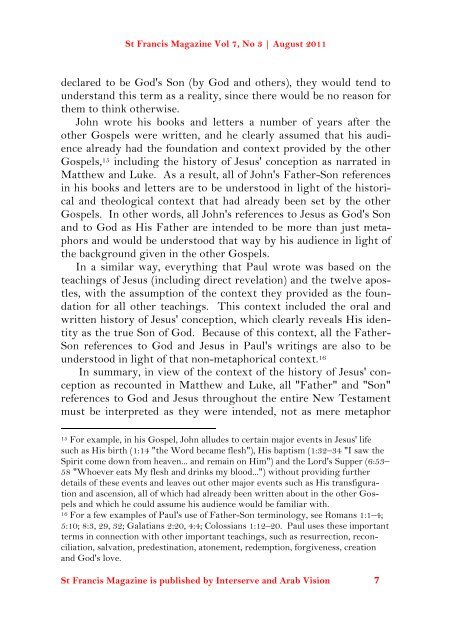Jesus, the Son of God: Biblical meaning, Muslim Understanding ...
Jesus, the Son of God: Biblical meaning, Muslim Understanding ...
Jesus, the Son of God: Biblical meaning, Muslim Understanding ...
Create successful ePaper yourself
Turn your PDF publications into a flip-book with our unique Google optimized e-Paper software.
St Francis Magazine Vol 7, No 3 | August 2011!declared to be <strong>God</strong>'s <strong>Son</strong> (by <strong>God</strong> and o<strong>the</strong>rs), <strong>the</strong>y would tend tounderstand this term as a reality, since <strong>the</strong>re would be no reason for<strong>the</strong>m to think o<strong>the</strong>rwise.John wrote his books and letters a number <strong>of</strong> years after <strong>the</strong>o<strong>the</strong>r Gospels were written, and he clearly assumed that his audiencealready had <strong>the</strong> foundation and context provided by <strong>the</strong> o<strong>the</strong>rGospels, 15 including <strong>the</strong> history <strong>of</strong> <strong>Jesus</strong>' conception as narrated inMat<strong>the</strong>w and Luke. As a result, all <strong>of</strong> John's Fa<strong>the</strong>r-<strong>Son</strong> referencesin his books and letters are to be understood in light <strong>of</strong> <strong>the</strong> historicaland <strong>the</strong>ological context that had already been set by <strong>the</strong> o<strong>the</strong>rGospels. In o<strong>the</strong>r words, all John's references to <strong>Jesus</strong> as <strong>God</strong>'s <strong>Son</strong>and to <strong>God</strong> as His Fa<strong>the</strong>r are intended to be more than just metaphorsand would be understood that way by his audience in light <strong>of</strong><strong>the</strong> background given in <strong>the</strong> o<strong>the</strong>r Gospels.In a similar way, everything that Paul wrote was based on <strong>the</strong>teachings <strong>of</strong> <strong>Jesus</strong> (including direct revelation) and <strong>the</strong> twelve apostles,with <strong>the</strong> assumption <strong>of</strong> <strong>the</strong> context <strong>the</strong>y provided as <strong>the</strong> foundationfor all o<strong>the</strong>r teachings. This context included <strong>the</strong> oral andwritten history <strong>of</strong> <strong>Jesus</strong>' conception, which clearly reveals His identityas <strong>the</strong> true <strong>Son</strong> <strong>of</strong> <strong>God</strong>. Because <strong>of</strong> this context, all <strong>the</strong> Fa<strong>the</strong>r-<strong>Son</strong> references to <strong>God</strong> and <strong>Jesus</strong> in Paul's writings are also to beunderstood in light <strong>of</strong> that non-metaphorical context. 16In summary, in view <strong>of</strong> <strong>the</strong> context <strong>of</strong> <strong>the</strong> history <strong>of</strong> <strong>Jesus</strong>' conceptionas recounted in Mat<strong>the</strong>w and Luke, all "Fa<strong>the</strong>r" and "<strong>Son</strong>"references to <strong>God</strong> and <strong>Jesus</strong> throughout <strong>the</strong> entire New Testamentmust be interpreted as <strong>the</strong>y were intended, not as mere metaphor!!!!!!!!!!!!!!!!!!!!!!!!!!!!!!!!!!!!!!!!!!!!!!!!!!!!!!!!15 For example, in his Gospel, John alludes to certain major events in <strong>Jesus</strong>' lifesuch as His birth (1:14 "<strong>the</strong> Word became flesh"), His baptism (1:32–34 "I saw <strong>the</strong>Spirit come down from heaven... and remain on Him") and <strong>the</strong> Lord's Supper (6:53–58 "Whoever eats My flesh and drinks my blood...") without providing fur<strong>the</strong>rdetails <strong>of</strong> <strong>the</strong>se events and leaves out o<strong>the</strong>r major events such as His transfigurationand ascension, all <strong>of</strong> which had already been written about in <strong>the</strong> o<strong>the</strong>r Gospelsand which he could assume his audience would be familiar with.16 For a few examples <strong>of</strong> Paul's use <strong>of</strong> Fa<strong>the</strong>r-<strong>Son</strong> terminology, see Romans 1:1–4;5:10; 8:3, 29, 32; Galatians 2:20, 4:4; Colossians 1:12–20. Paul uses <strong>the</strong>se importantterms in connection with o<strong>the</strong>r important teachings, such as resurrection, reconciliation,salvation, predestination, atonement, redemption, forgiveness, creationand <strong>God</strong>'s love.St Francis Magazine is published by Interserve and Arab Vision!'!







![Reflections on Surah Fatiha and the Lord's Prayer[1] - St.Francis ...](https://img.yumpu.com/49377951/1/184x260/reflections-on-surah-fatiha-and-the-lords-prayer1-stfrancis-.jpg?quality=85)








